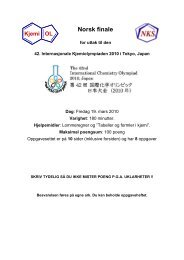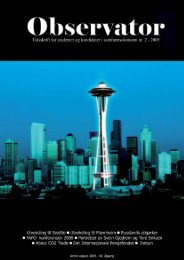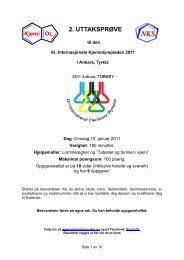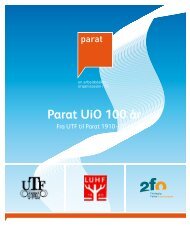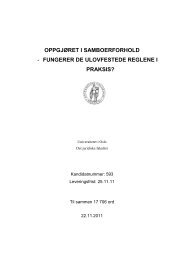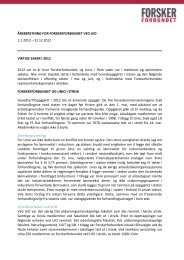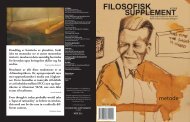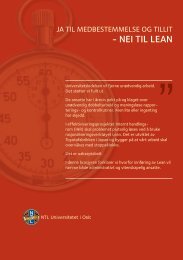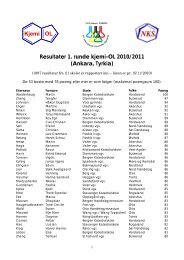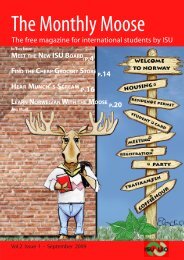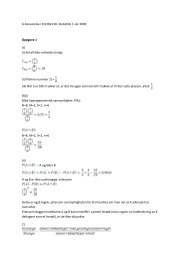filosofisk supplement - Universitetet i Oslo
filosofisk supplement - Universitetet i Oslo
filosofisk supplement - Universitetet i Oslo
- No tags were found...
You also want an ePaper? Increase the reach of your titles
YUMPU automatically turns print PDFs into web optimized ePapers that Google loves.
Se a d Zi m e r ithe Umayyad and Abbasid Empires. The word Islam inthe Koran means the primordial religion, the pure ritual,and the complete, loving submission to Allah; thissubmission was symbolized by the mythical personalityof Abraham in the Koran. The Koran says, “Abrahamwas not a Jew nor a Christian, but he was true in faith,and [Muslim] bowed his will to God’s, which is Islam”(19:67). The context of the word in the Koran leaves nospace for doubting the primordial and original meaningof the word Muslim. But the jurists and the theologiansforgot this primordial meaning in the crowd of thepolemical disputes for the sake of hegemony under thewing of the empire (this is the special context of imperialIslam). Only historians, and to some extent the Sufis, attendto the study of the Koranic meaning of Islam, thatis, as a primordial or original religion, as a primordialand foundational experience of what is divine. This is thedifference between it [the Koranic Islam] and the laterIslam, that is, the ritual and liturgical Islam. 26The gist of Arkoun’s historical analysis is not difficult todetect. It is that in the final instance, Islam is anothername\ label for the other two religions of the Book andvice versa. The primordial meaning of Islam is submissionand whether Muslims, or non-Muslim for that matter, likeit or not, all revealed religions rely on and bear this primordialmeaning. All religions are instances and expressions ofthe same religious fact or phenomenon. Reflecting overthis analysis it seems rather improbable for it to be true orindeed plausible. Notwithstanding Arkoun’s excellent historicalanalysis and deconstruction of Islamic reason, hisvast arsenal of resources, and his rather tenuous distinctionbetween religion as an anthropological phenomenonpointing in the dimension of the beyond evoked by therich symbolism as to substance and religion as an interpretationconditioned by the cultural contexts of its actantsas to form, his conclusions nonetheless are premature. Itseems to allow for one or both of the two impossibilities:i) a rather impossible and even bizarre religious creature,one that can be religious in general, a sort of free-floatingbeliever, and/or ii) a space for not only irreconcilable beliefsbut also for apparent contradictions. Not the enclosure of amultitude of reconcilable contradictions within the totalityof a belief system, but beliefs which the belief system assuch excludes. Paradoxically, Arkoun provides his adversaries,i.e. religious ideologists and fundamentalists with ablank cheque and an implicit apology for filling up thisempty universal with their narrow political visions.Clearly then, Islam and the other religions of the Bookare not only loving and complete submission to God in abstract.In that sense, indeed, we are all Muslims, as Goetheknew very well. Islam as a set of not Sharica doctrines as developedlater, but Koranic doctrines as developed in the historicalspan of revelation, is clearly discernible and differentfrom the other two religions of the Book. Fundamentally,this is what is or was important to Muslims and not the factthat Islam means total submission to God. It is this phenomenologicaland historical aspect of Islam which gives Islamits historical identity, authenticity and definition, as well asMuslims their headaches: Islam as a concrete historical manifestationof the divine will. Once the particular instanceof religion is renounced in favour of some common imaginaryrepresentation or universal religious Law, the way isfully open to suspend Religion itself. Religion ‘disappeared’in modernity when it was rendered abstract, equated withan empty universal Law without doctrinal support. 27In the above quoted passage, Arkoun has given the clearestdefinition of what an ‘Islam without Islam’ means.That is, Islam as submission to God in abstract versus Islamas submission to God by way of submitting to the historicalexpression of divine will. ‘Islam without Islam’ meanssurrendering oneself to and entering a free covenant withGod as Muslims find it proper to confer a meaning on theirlives without necessarily assuming Islam’s historical expressionsubjectively. Arkoun’s project of retrieving the originalmeaning of Islam is thus not entirely or ideologicallyinnocent. The particularities of Islam can be exhibited inmuseums and historical documents. Islam, ‘yes, but notquite; let us keep our finger crossed and maintain an innerdistance; better a finger crossed than a finger burned,’ asZizek beautifully declares. 28 Arkoun thus subsumes all particularinstances of religion under a universal and primordialmeaning of religion, thereby denying the possibility ofeach religion’s ‘own mode of universality’. He falls underthe illusion, peculiar of modernity according to Zizek 29 thatIslam can exist outside the network of its ‘inessential’, ‘irrelevant’but specific characteristics of Koranic Islam andits conditions of existence; that by distinguishing the unessentialfrom the essential and accordingly disregard the necessarylink between the two, viz. that renunciation of theparticular content and specificity will not affect or amountto the renunciation of Islam itself.Zizek referred to the same problem in one of his writingswhen explaining the Hegelian concept of ‘concreteuniversality’. As an instance of the ‘concrete universality,’Zizek argues that with religion, ‘it is not enough to saythat the genus Religion is divided into a multitude of species(‘primitive’ animism, pagan polytheism, monotheism,10



